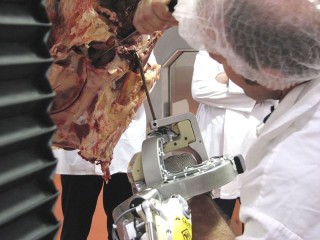 The field of beef processing automation and robotics promises to take a major leap forward following a decision to commercialise a new Australian technology called HookAssist, which works collaboratively with operators to amplify – not replace – human effort.
The field of beef processing automation and robotics promises to take a major leap forward following a decision to commercialise a new Australian technology called HookAssist, which works collaboratively with operators to amplify – not replace – human effort.
To the technological layman, the closest analogy is the application of power steering in a motor car.
Meat & Livestock Australia has chosen engineering research and design companies Kinea Design and Scott Technology to develop and commercialise HookAssist, the world’s first beef boning collaborative co-robot.
A prototype of the technology is now under trial with 'one of the world’s largest meat companies.'
JBS Australia has confirmed that it is the company involved in trialling the HookAssist technology, at its Dinmore plant.
Among its wide range of attractions, HookAssist aims to increase boning yield and productivity, reduce fatigue and hence workplace injuries, and alleviate labour shortages in the meat processing industry.
Designed to take-on heavy physical demands of meatworkers who de-bone large cuts of meat in processing plants, the technology is capable of increasing operator pull-strength by a factor of ten to one. Unlike conventional automation solutions, HookAssist is not a tool to replace operators, but instead is ‘worn’ by the operator to enhance human effort.
This could help overcome any resistance to the adoption of the new technology within the workforce, because it does not threaten staff levels.
Commercialisation is expected to be completed in the second half of 2012.
HookAssist is the result of a five-year program, initiated by MLA and the Australian Meat Processor Corporation to create technologies to increase competitiveness in the Australian processing industry through yield and productivity improvement, creating a better work environment and reducing strains and injuries, and moderating labour shortages.
“Research shows that over the course of an eight-hour beef-boning operator shift, yield decreases and the incidence of job injuries increase due to worker fatigue,” said David Doral, MLA’s processing and efficiency sustainability team manager.
“By taking on the heavy physical requirements of the work, HookAssist frees operators to focus on their craft, thereby increasing productivity and yield.”
Originally intended for boning hindquarters, HookAssist can be modified for a range of applications including forequarter boning, small-stock boning and slaughter, materials handling and other strenuous meat processing industry activities.
Power Steering for beef boners
Just as power steering amplifies the steering effort exerted by a motor car driver, if an operator exerts a 5kg pulling force, a boner using HookAssist pulls with 50kg of force.
A two-axis power-assist on the hook does 90pc of the work of pulling, tearing, and/or lifting large sections of cut meat, while allowing four additional axes of passive motion for maximum manoeuvrability, technical information says.
Workers control the power-amplifying hook by grasping a handle on a gimbal and manoeuvring it as they would normally. There are no buttons to press, no training to undergo.
MLA and AMPC commissioned Kinea Design to develop HookAssist after a global review found company engineers had solved similar challenges for the automotive industry. Experts in human-interactive mechatronics, Kinea engineers are the inventors of ‘Cobotics’ – collaborative robots that work beside or cooperatively with people enhancing individual human capabilities, performance and safety.
“We are honoured to have been chosen to apply our expertise in human-machine interaction to address key challenges in the meat processing industry,” said Julio Santos-Munné, chief of operations, Kinea Design, said in a statement.
In addition to being chosen as global commercialiser of HookAssist, Scott Technology has now invested in the technology, and will working alongside MLA to bring HookAssist to market.
“We believe HookAssist will provide a powerful, competitive advantage for beef boning operations and are excited to have been chosen to lead its commercialisation efforts,” said Sean Staring, general manager of Scott Technology. Mr Starling is a former MLA employee, where he worked in processing technology innovation.
“Early test results have shown HookAssist to be effective at alleviating physical burden on workers, while also being completely intuitive and transparent. This combination will help drive up yield, while enabling the operator to keep knife skills and workmanship at optimum levels,” Mr Starling said.
